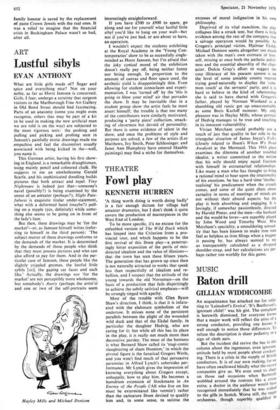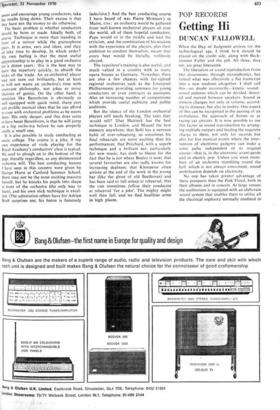MUSIC
Baton drill
GILLIAN WIDDICOMBE
An acquaintance has attacked me for refer- ring to `Leinsdorf's Eroica'. 'It's Beethoven's, ignorant child!' was his gist. The complaint is herewith dismissed, for everyone knows that a major work will reflect the arms of a strong conductor, providing one knows it well enough to notice those differences. To refuse the description is sheer pedantry or a sign of cloth ears. But the incident did revive the bee in this column about the ingenuous, even ignorant, attitude held by most people about conduct- ing. There is a crisis in the supply of British conductors. It is of our own making, for we have often swallowed blindly what the record companies give us. We even used to cheer on those sad occasions when Barbirolli wobbled around the rostrum like a circus extra; a doctor in the audience would have recognised immediately that he was soaked to the gills in Scotch. Worse still, the major orchestras, though superbly qualified to assess and encourage young conductors, take the insults lying down. Their excuse is that they have not the money to do otherwise. The basic problem is whether conductors should be born or made. Ideally both, of course. Technique is more than standing in front of a mirror while the gramophone plays. It is arms, ears and ideas, and they all take time to develop. In which order? My own feeling is that the most useful apprenticeship is to play in a good orchestra for a dozen years: this is the best way to learn the repertory quickly, to absorb the tricks of-the trade. An ex-orchestral player may not turn out brilliantly, but at least he will not waste an orchestra's time with irrelevant philosophy, wet jokes or noisy illusions of genius. On the other hand, a musician like Barenboim is obviously so well equipped with quick mind, sharp ears and prolific musical ideas that he can afford to cope with orchestral problems as he meets them. His only danger, and this does seem to have beset Barenboim, is that he will jump on a big orchestra before he can properly cradle a small one.
It is also possible to study conducting at music college. The course is a joke, if my own experience of viola playing for the Royal Academy's conductors' class is typical. We used to plough on to the bottom of the page. literally regardless, as any disinterested orchestra will. The best conducting lessons I have seen in this country were given by George Hurst at Canford Summer School. Hurst may not be the most exciting maestro himself, but he knocks his pupils into shape in front of the orchestra (the only way to learn), and his own stick technique is excel- lent. (The admiration others have for Adrian Boult surprises me; his baton is famously
indecisive.) And the best conducting course I have heard of was Pierre Monteux's in Maine, USA: an orchestra would be gathered from well-known orchestral players all over the world, all of them hopeful conductors. Papa would sit in the middle and lead the criticism, and the combination of his wisdom with the experience of the players, plus their ambition to conduct themselves, meant that every beat would be literally, ruthlessly obeyed.
The repetiteur's training is also useful, and much valued in a country with as many opera houses as Germany. Nowadays there are also a few chances with far-sighted regional orchestras such as the Liverpool Philharmonic providing seminars for young conductors or even contracts as assistants. Also an increasing number of competitions which provide useful publicity and public auditions.
But the silence of the London orchestral players still needs breaking. The tales they would tell? That Haitinck has the best technique in London, and Maazel the best memory anywhere; that Solti has a nervous habit of over-rehearsing, so sometimes his final rehearsals are more exciting than his performances; that Pritchard, with a superb technique and a brilliant ear, particularly for new music, has sloth to blame for the fact that he is not where Boulez is now; that several favourites are also sadly known for increasing deafness; that Klemperer often arrives at the end of the work in the wrong bar (like the ghost of old Beethoven) and has been said to fall asleep at rehearsal; that the tso sometimes follow their conductor at rehearsal 'for a joke'. The mighty might well then fall, and we find healthier arms in high places.















































 Previous page
Previous page